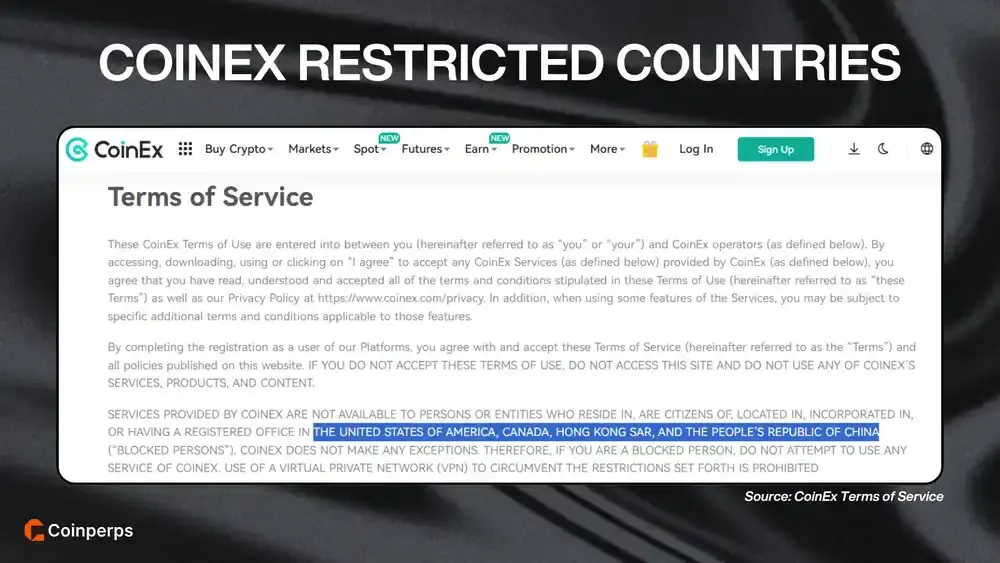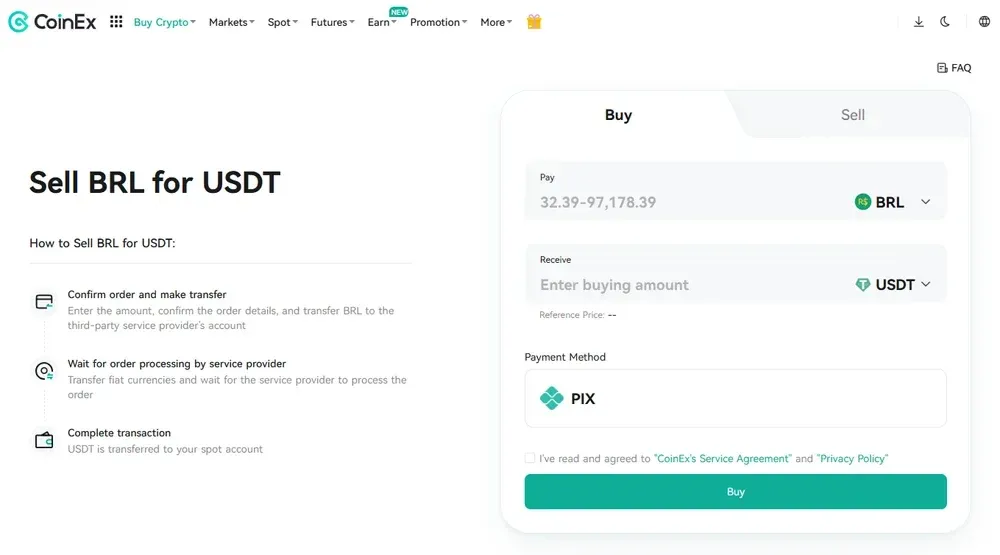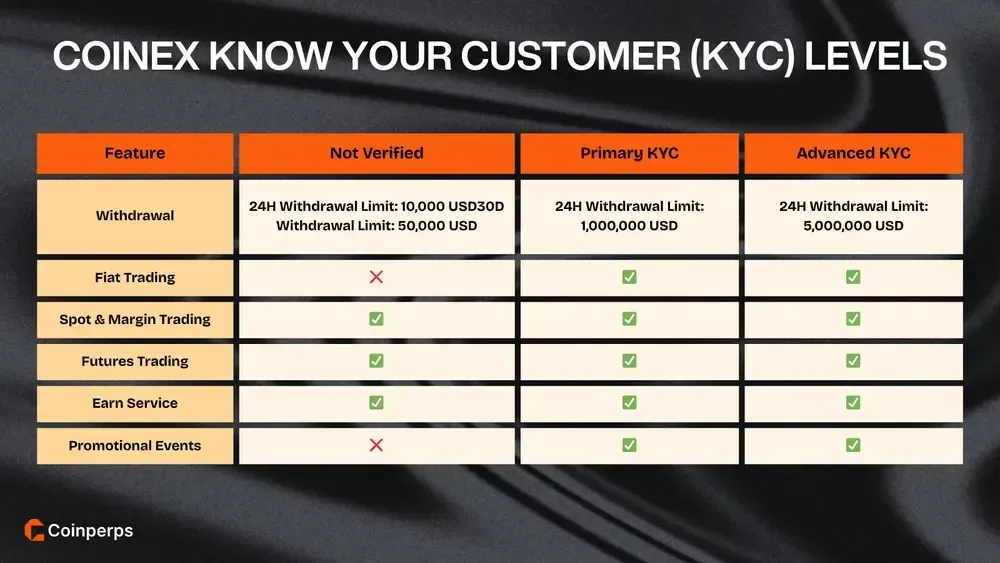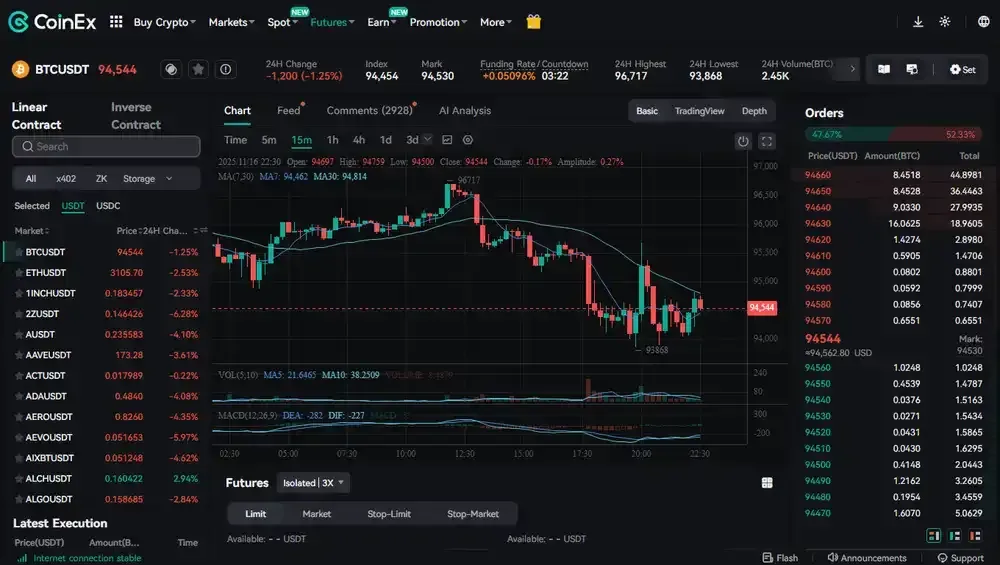- 24H Open Interest$92,109,788,884.690.17%
- 24h Liquidation$72,368,496.420%
- 24h long/short Ratio50.41% / 49.59%
- Fear & Greed Index8
- Bitcoin Price$67,832.40.04%
- Ethereum Price$1,968.950.33%
- Solana Price$84.730.47%
- XRP Price$1.420.25%
- 24H Open Interest$92,109,788,884.690.17%
- 24h Liquidation$72,368,496.420%
- 24h long/short Ratio50.41% / 49.59%
- Fear & Greed Index8
- Bitcoin Price$67,832.40.04%
- Ethereum Price$1,968.950.33%
- Solana Price$84.730.47%
- XRP Price$1.420.25%
CoinEx Restricted Countries List 2025 – Regions & Alternatives
Find updated details about CoinEx’s restricted regions in 2025, including compliance rules, supported jurisdictions, and alternative licensed crypto exchanges.
Key Takeaways:
- CoinEx restricts access to users in the United States, Canada, China, and Hong Kong, reflecting strict geo-compliance requirements and explicit prohibitions on VPN.
- The platform supports users across more than 200 countries, offering broad fiat access through Quick Buy, global on-ramp partners, and P2P markets.
- Users in restricted jurisdictions may benefit from regulated alternatives offering clearer licensing, stronger fiat coverage, and derivatives access adjusted to local compliance rules.
CoinEx
CoinEx, founded in 2017 by ViaBTC creator Haipo Yang, is a Seychelles-based exchange listing 1,300+ assets, offering spot, futures up to 100x, and $600M in daily trading volume.
Features
Fees
Regulation
Overall Rating
Many users struggle to confirm whether CoinEx operates legally in their country due to inconsistent regional guidance. This uncertainty creates real risk because attempting registration or deposits from restricted locations can trigger immediate access limitations.
CoinEx also raises questions about how jurisdiction affects KYC (Know Your Customer) steps, fiat access, and long term account safety. These concerns make verifying regional availability essential before funding accounts or engaging in any trading activity.
Learn where CoinEx is actually supported today. ⬇️
List of CoinEx Restricted Countries
CoinEx defines “Blocked Persons” in its Terms of Use as users located in jurisdictions where regulatory prohibitions compel the platform to completely restrict and deny service access.
Restricted countries are listed below:
- United States of America: Full access prohibition covering residents, citizens, entities, and registered offices due to extensive federal compliance exposure and associated enforcement risks.
- Canada: Complete service ban tied to national securities requirements restricting centralized exchanges and digital asset trading platforms from operating without specific registrations.
- People’s Republic of China (Mainland): Usage blocked because national regulations prohibit cryptocurrency exchange operations and impose sweeping restrictions on digital asset trading.
- Hong Kong SAR: Access barred due to local virtual asset licensing rules and regulatory frameworks governing centralized trading platforms and retail investor participation.
CoinEx additionally notes that users must comply with their own local laws and reserves the right to extend restrictions to further jurisdictions as regulatory requirements evolve.

Countries and Currencies Supported by CoinEx
CoinEx serves millions of users across 200+ countries and regions, supported by an ecosystem available in 18 languages and more than 2,000 local communities. The exchange offers a wide range of fiat access channels, including Quick Buy, P2P payments, and numerous global on-ramp providers.
Below is a list of major fiat currencies supported:
- USD (United States Dollar): Provides broad coverage through Quick Buy, P2P markets, and multiple on-ramps including Banxa, Simplex, Mercuryo, and MoonPay.
- EUR (Euro): Widely supported with aggregated liquidity quotes on Quick Buy and consistent access through regulated fiat gateways across the EU region.
- GBP (British Pound): Available via Quick Buy and third-party on-ramps, enabling straightforward fiat-to-crypto conversions with competitive real-time quote aggregation.
- TRY (Turkish Lira): Supported primarily through P2P channels and regional payment partners offering fast settlement and localized liquidity for Turkish users.
- BRL (Brazilian Real): Accessible through P2P and select global on-ramps, enabling smooth buy/sell flows for users in Brazil’s growing crypto market.
- INR (Indian Rupee): Backed by P2P rails and on-ramp partners like Onmeta, offering near-instant pricing and improved liquidity for Indian users.
- AED (UAE Dirham): Supported via Quick Buy and recognized on-ramps offering streamlined conversion for users in the Gulf region’s active digital asset market.
- PHP (Philippine Peso): Frequently used in P2P trades with additional access through liquidity providers that support low-cost conversions and localized fiat options.
Important: Fiat fees vary depending on liquidity providers, payment channels, and local regulations, with Quick Buy typically folding 1-2% liquidity-provider fees. Users may experience differences in slippage across currencies because each on-ramp partner operates under its own processing schedules.

Does CoinEx Require Mandatory KYC Verification?
According to CoinEx’s guidelines, users may trade without KYC checks, but withdrawals stay limited to “24H Withdrawal Limit: 10,000 USD.” The documentation adds that unverified accounts face a “30D Withdrawal Limit: 50,000 USD,” while still accessing spot, margin, futures, and Earn services.
Primary ID Verification increases withdrawal capacity to a “24H Withdrawal Limit: 1,000,000 USD” and unlocks fiat trading plus promotional events. This tier requires uploading an ID card, driver’s license, or passport, followed by facial recognition or a selfie-based authentication step.
Advanced ID Verification lifts the cap to a “24H Withdrawal Limit: 5,000,000 USD” and introduces nationality and address checks when residence differs from their ID. Users must submit recent proof of address and complete facial verification or a compliant selfie containing the handwritten declaration.
Review results for all verification levels typically arrive within one to three business days, reflecting CoinEx’s AML and risk-control procedures. These verification steps are required for Quick Buy fiat access and may also apply to regional payment partners depending on regulatory demands.

Does CoinEx Restrict Derivatives Trading?
CoinEx permits margin and perpetual contract trading but enforces critical risk-control measures outlined in its official Loan, Margin Trading, and Perpetual Contract Risk Disclosures.
Below are the key derivative-related restrictions:
- Leverage limitations: CoinEx currently caps margin trading at a maximum of 5x leverage, ensuring borrowing remains constrained under its internal loan-multiple framework.
- Forced liquidation authority: The platform may reduce or entirely close positions whenever margin levels fall below requirements or repayment deadlines are reached.
- Abnormal-market intervention: CoinEx reserves the right to cancel trades, roll back executions, or undo transaction periods during system failures or extreme market disruptions.
- Prohibition of unfair trading practices: Activities such as market manipulation, system exploitation, or malicious price influence may trigger account freezes, trade reversals, or transaction restrictions.
- Position and order quantity controls: When CoinEx determines that large positions pose systemic risk, it may limit openings, reduce orders, or forcibly close user positions.
- Loss recovery rights: If extreme volatility produces losses exceeding available margin after applying all risk-control methods, CoinEx may seek repayment from the account holder.
- Fund-usage restrictions: The platform may restrict access to funds, suspend derivatives usage, or forcibly close positions if it detects legal violations, AML concerns, or harmful activity.

Is CoinEx Banned in the US?
CoinEx’s Terms classify all U.S. residents, citizens, entities, and registered offices as “Blocked Persons,” fully prohibiting them from using any CoinEx services. The platform makes no exceptions, confirming that U.S. users cannot register, trade, deposit, or interact with the exchange.
Because U.S. persons cannot open accounts, they cannot complete KYC, use perpetuals, or access fiat services like Quick Buy. The Terms also forbid VPN access to bypass restrictions, reinforcing CoinEx’s adherence to global compliance and sanctions requirements.
What Licenses Does CoinEx Have?
Licenses and regulatory registrations play a central role in determining how CoinEx meets AML, custody, and compliance requirements across different jurisdictions.
Below are the confirmed licensing and regulatory statuses:
- United States: CoinEx received an MSB registration (31000205450387) in 2021, although U.S. regulators later forced it to exit New York and prohibit U.S. users.
- Estonia: CoinEx announced an Estonian FIU license in 2019, but Estonia significantly tightened VASP rules in 2022–2023, causing many earlier licenses to lapse or be revoked.
- Poland: CoinEx recently secured a Polish VASP registration as part of its European compliance strategy ahead of MiCA implementation later in 2025.
- Canada: CoinEx entities were sanctioned in Québec, fined $2 million, and ordered permanently blocked from accessing Canada without AMF authorization.
- United States: CoinEx settled with the NYAG in 2023, paid $1.8 million, and agreed to block U.S. users and withdraw from New York entirely.
- Thailand: Thailand’s SEC confirmed CoinEx is not licensed locally and warned investors about unlicensed solicitation and trading services.
- Multiple Canadian Provinces: CoinEx is listed as a banned or restricted crypto platform across several Canadian provincial securities regulators due to unregistered derivatives and securities activity.
CoinEx’s regulatory posture is therefore mixed: it holds a valid Polish VASP registration, previously held an Estonian FIU license that may no longer be active, and maintains a FinCEN MSB registration but is legally barred from serving U.S. customers following enforcement actions.
Best Alternatives if CoinEx is Unavailable in Your Country
Many users need alternatives when CoinEx is restricted, limiting trading access across important regional markets today. Evaluating regulated exchanges helps users replace CoinEx features while maintaining compliance obligations and dependable cross-border access.
Coinbase offers U.S. users stronger oversight than CoinEx through its FinCEN MSB registration, state money-transmitter licenses, and CFTC-approved futures platform. Crypto.com expands U.S. fiat access with ACH, cards, and licensed operations that provide more regulated funding pathways than CoinEx.
Kraken gives European traders firmer licensing than CoinEx through multiple EU VASP registrations and reliable euro liquidity supported by SEPA rails. eToro improves European coverage with CySEC and FCA oversight, combining regulated multi-asset investing with structured protections.
Bybit provides Asian traders deeper derivatives liquidity than CoinEx, backed by VARA and AFSA approvals supporting perpetual markets. Binance strengthens Asian access with industry-leading liquidity, and broad product coverage supported by licensed operations in several jurisdictions.
Bottom Line
Users should carefully review CoinEx’s restricted countries, KYC requirements, and fiat access rules before opening accounts to avoid service disruptions or unexpected regional limitations.
CoinEx is strengthening its compliance profile through new registrations such as the Polish VASP while navigating enforcement actions that may impact its geographic availability in the coming years.
Traders should monitor regulatory updates closely and maintain alternative exchanges with stronger licensing footprints to ensure uninterrupted access to crypto services across shifting jurisdictions.
Frequently asked questions
CoinEx’s Terms clearly prohibit VPN usage for circumventing geographic restrictions, making any attempted access a direct breach of its compliance policies. Violating these requirements can lead to account freezes or blocked withdrawals, so users should only access CoinEx from permitted jurisdictions.
If a jurisdiction is newly classified as restricted, CoinEx may limit features or require accounts to close positions and withdraw assets when allowed. Users should monitor regional updates closely and move funds promptly if any changes appear relevant to their location.
CoinEx states that users must comply with their own jurisdiction’s laws, which may include providing required tax or reporting information when asked. Specific reporting obligations vary widely by region, so users should consult qualified professionals for accurate guidance.
CoinEx maintains a 1:1 proof of reserves and operates a Shield Fund, providing transparency for asset backing and incident protection. Despite these protections, users should consider personal risk tolerance and diversify storage methods across reputable platforms or self-custody products.
.avif)